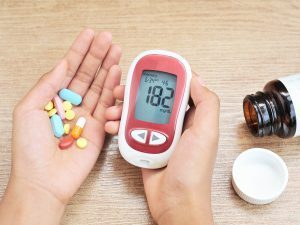- Home
- Editorial
- News
- Practice Guidelines
- Anesthesiology Guidelines
- Cancer Guidelines
- Cardiac Sciences Guidelines
- Critical Care Guidelines
- Dentistry Guidelines
- Dermatology Guidelines
- Diabetes and Endo Guidelines
- Diagnostics Guidelines
- ENT Guidelines
- Featured Practice Guidelines
- Gastroenterology Guidelines
- Geriatrics Guidelines
- Medicine Guidelines
- Nephrology Guidelines
- Neurosciences Guidelines
- Obs and Gynae Guidelines
- Ophthalmology Guidelines
- Orthopaedics Guidelines
- Paediatrics Guidelines
- Psychiatry Guidelines
- Pulmonology Guidelines
- Radiology Guidelines
- Surgery Guidelines
- Urology Guidelines
Blood sugar: Early addition of SGLT2 inhibitor dapagliflozin helps achieve better goals

Blood sugar: Early addition of SGLT2 inhibitor dapagliflozin helps achieve better goals,according to a recent study.
Early dapagliflozin use is associated with a higher likelihood of achieving HbA1c (blood sugar) goals in patients with type 2 diabetes .
Early treatment intensification for type 2 diabetes mellitus (T2DM) is often required to achieve blood sugar control and avoid longer-term complications. Now, a recent study has found that earlier addition of the SGLT2 inhibitor dapagliflozin results in greater blood sugar reductions than the later addition.
Findings of the study, published in the journal Diabetes Research and Clinical Practice support earlier use of dapagliflozin in the treatment pathway of type 2 diabetes.
John P. H. Wilding, Institute of Ageing and Chronic Disease, University of Liverpool, Liverpool, United Kingdom, and colleagues assessed associations between early versus later dapagliflozin initiation with changes in glucose control, weight, and blood pressure using data from the UK Clinical Practice Research Datalink (CPRD).
The study included 3,774 patients with type 2 diabetes initiating dapagliflozin between November 2012 and August 2016 and with prior oral T2DM therapy. The researchers assessed the relationship between early (first intensification after metformin or sulfonylurea monotherapy) and later (second or higher-order intensification) dapagliflozin use and baseline changes in glycated haemoglobin A1c (HbA1c; ≥1.0% absolute reduction), weight (≥5.0% relative loss), and systolic blood pressure (SBP; ≥2mmHg absolute reduction) after 6-12 months.
Also Read: Blood sugar levels in children increase on long-time exposure to air pollution, finds study
Key findings of the study include:
- Overall, 25% of patients (951 of 3,774) were early users and 75% (2,823 of 3,774) were later users.
- Later users were older, more likely to be men, and had longer disease duration.
- Early and later, users, had similar baseline mean HbA1c levels.
- For early versus later users, respectively, baseline-adjusted mean (95% confidence interval [CI]) reductions were 1.54% (-1.65, -1.44) versus 1.02% (-1.08, -0.97) in HbA1c, 3.31% (-4.37, -2.25) versus 4.06% (-5.05, -3.07) in weight, and 2.50 mm Hg (-3.89, -1.11) versus 2.84 mm Hg (-3.67, -2.01) in SBP.
- Early versus later use was associated with a greater likelihood of adjusted HbA1c reduction of ≥1%.
Also Read: Vigorous exercise can lead to low blood sugar in teenagers with type 1 diabetes
"Glycaemic benefits were greater with early versus later dapagliflozin intensification. These results support broader and earlier dapagliflozin use," concluded the authors.
To read the complete study log on to https://doi.org/10.1016/j.diabres.2019.107791

Disclaimer: This site is primarily intended for healthcare professionals. Any content/information on this website does not replace the advice of medical and/or health professionals and should not be construed as medical/diagnostic advice/endorsement or prescription. Use of this site is subject to our terms of use, privacy policy, advertisement policy. © 2020 Minerva Medical Treatment Pvt Ltd